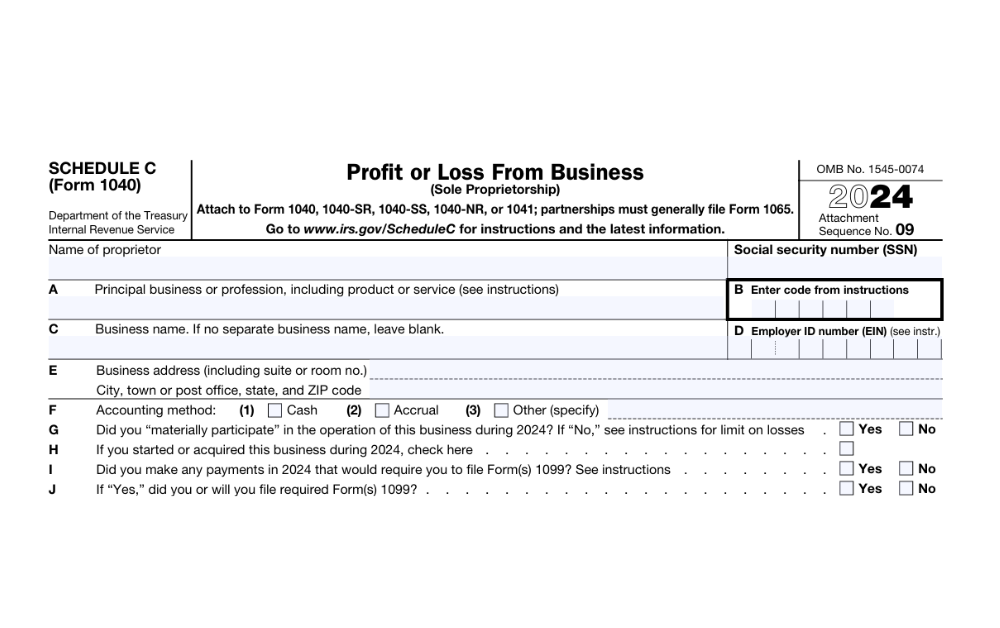Schedule C for American Expats: Your Business Tax Filing Guide

- What Expenses Can I Deduct on Schedule C as an Expat?
- Do I Need to File Schedule C if I Live Abroad?
- How Do I Fill Out Schedule C as an Expat?
- How Do the FEIE and Foreign Tax Credit Help Expat Business Owners?
- What About Self-Employment Tax for Expat Businesses?
- Common Schedule C Scenarios for Expats
- What Filing Deadlines Apply to Expat Businesses?
- Common Mistakes to Avoid With Schedule C Filing
- When Should I Get Professional Help?
- Get Your Expat Business Taxes Done Right
The IRS reports that the majority of Schedule C filers don’t owe additional federal income tax after applying business deductions and available credits. This percentage is often even higher for American expats running businesses abroad thanks to robust expat tax protections.
Schedule C (Form 1040) is how you report profit or loss from your sole proprietorship or single-member LLC to the IRS. As an American expat, you’ll use Schedule C if you’re freelancing, consulting, running an online business, or operating any unincorporated business while living abroad. The good news? You have access to the same business deductions as stateside entrepreneurs, plus additional expat-specific protections that can significantly reduce or eliminate your US tax liability.
When their returns are prepared correctly, most expat business owners owe little to no US federal income tax. At Greenback Tax Services, we’ve helped over 23,000 American expats file over 71,000 returns while maintaining a 4.9-star average on TrustPilot. Our team of CPAs and Enrolled Agents (many expats themselves) understands the unique challenges of running a business while living abroad.
What Expenses Can I Deduct on Schedule C as an Expat?
You can deduct the same business expenses as US-based entrepreneurs, plus some expat-specific advantages:
Standard Business Expenses:
- Home office expenses (even in your foreign residence)
- Business travel and transportation costs
- Professional development and training
- Equipment and software purchases
- Marketing and advertising expenses
- Professional services (legal, accounting, consulting)
Income You’ll Report:
- Client payments and sales revenue
- Income from digital products or services
- Rental income from business property
- Any other business-related income
Unlike employees who might receive a Form W-2, most expat business owners won’t receive a 1099 from foreign clients. You’re still required to report all income, even without formal documentation.
Do I Need to File Schedule C if I Live Abroad?
You must file Schedule C if your business had net earnings of $400 or more during the tax year. This threshold is the same whether you live in Singapore, London, or elsewhere.
You’ll typically file Schedule C if you’re:
- A freelancer or independent contractor
- Running an online business or e-commerce store
- Providing consulting services
- Operating a sole proprietorship abroad
- Managing rental properties as a business
You don’t need Schedule C if:
- You’re employed by a foreign company (use Form 1040)
- Your business is incorporated abroad (different filing requirements apply)
- You had no business income during the tax year
Pro Tip: Even if your foreign business lost money, filing Schedule C can be beneficial. Business losses can offset other income and potentially create tax refunds.
Even if your foreign business lost money, filing Schedule C can be beneficial. Business losses can offset other income and potentially create tax refunds.
How Do I Fill Out Schedule C as an Expat?
Schedule C may look intimidating, but it follows a logical flow that becomes straightforward once you understand the key sections. As an expat, you’ll need to pay special attention to currency conversion and documentation requirements.
Part I: Income Section
- Line 1: Report your gross receipts or sales in US dollars
- Convert all foreign currency using the average exchange rate for the year or the rate on each transaction date
- Include all business income, even if you didn’t receive a 1099 from foreign clients
- Don’t exclude income here – exclusions happen on Form 2555 for FEIE
Part II: Expenses Section
The expense section is where expats often find significant tax savings:
Lines 8-27: Common business expenses you can deduct:
- Line 8: Advertising costs (including online marketing in foreign countries)
- Line 9: Car and truck expenses (for business use of vehicles abroad)
- Line 13: Depreciation (for business equipment, even if purchased overseas)
- Line 16a: Insurance premiums for business coverage abroad
- Line 18: Office expenses (supplies, software, subscriptions)
- Line 20a: Rent or lease payments for business space in your foreign country
- Line 22: Supplies needed for your business operations
- Line 24a: Travel expenses (business travel while living abroad)
- Line 25: Utilities for business use (portion of your foreign residence utilities)
Part III: Cost of Goods Sold (if applicable):
Only complete this section if you sell physical products. Most service-based expat businesses can skip this part.
Part IV: Information on Your Vehicle:
Complete only if you’re claiming car expenses for business use abroad.
Part V: Other Expenses
Use line 48 to list business expenses that don’t fit other categories, such as:
- Professional licensing fees in your country of residence
- Currency conversion fees for business transactions
- International banking fees for business accounts
Key Expat Considerations:
- Documentation: Keep detailed records since you may not receive formal tax documents from foreign clients
- Currency Conversion: Use consistent methods and document exchange rates used
- Home Office: You can claim home office expenses for your foreign residence if it’s used exclusively for business
- Foreign Address: Use your foreign business address if different from your home address
Line 31 (Net Profit/Loss): This figure flows to Form 1040 and determines your self-employment tax liability, even if the income is later excluded through FEIE.

The completed Schedule C integrates with other expat forms – your business income appears on Form 1040, while Form 2555 (for FEIE) or Form 1116 (for Foreign Tax Credit) can reduce or eliminate the tax on that income.
Keep digital copies of all receipts and invoices, as physical documents can be difficult to obtain if you’re living abroad and the IRS requests documentation.
Whether you’re years behind or just unsure about the thresholds, our team is ready to help.
How Do the FEIE and Foreign Tax Credit Help Expat Business Owners?
American expats have access to powerful tools that can dramatically reduce their US tax liability:
Foreign Earned Income Exclusion (FEIE)
The FEIE allows you to exclude up to $130,000 for the 2025 tax year of foreign earned income from US taxation. For business owners, this means:
- Your Schedule C business income can qualify for exclusion
- You must meet either the Physical Presence Test (330 days abroad) or Bona Fide Residence Test
- Self-employment tax may still apply to excluded income
Sarah runs a graphic design business from Barcelona and earned $85,000 in 2024. Using the FEIE, she excludes the entire amount from US income tax, resulting in a federal income tax liability of $0. (the 2024 tax year amount was $126,500)

Foreign Tax Credit (FTC)
The Foreign Tax Credit provides a dollar-for-dollar credit for foreign taxes paid on business income. For expats in high-tax countries, this is often more beneficial than the FEIE.
James operates a consulting business in Germany, earning $90,000 and paying $28,000 in German taxes. He can claim the full $28,000 as a credit against his US tax liability, often eliminating it entirely. (The 2024 tax year amount was $126,500)

What About Self-Employment Tax for Expat Businesses?
Self-employment tax (Social Security and Medicare) applies to your Schedule C profits at 15.3%, even if you exclude the income using FEIE. However, totalization agreements between the US and many countries can eliminate dual social security taxation.
Countries with totalization agreements include: Germany, UK, Canada, Australia, Japan, and 25+ others.
Self-employment tax applies to profits over $400, regardless of whether you owe income tax.
Common Schedule C Scenarios for Expats
Digital Nomad Freelancer
- Situation: You provide writing services for US and international clients while traveling.
- Tax Strategy: Use FEIE to exclude income up to the annual limit. Track business expenses carefully for maximum deductions.
- Likely Outcome: Zero federal income tax if income is under FEIE limit.
Expat Consultant in High-Tax Country
- Situation: You run a consulting business in France, paying substantial French taxes.
- Tax Strategy: Use Foreign Tax Credit to offset US tax liability with French taxes paid.
- Likely Outcome: Zero federal income tax due to high foreign tax credits.
Online Business Owner
- Situation: You sell products online while living in a low-tax jurisdiction like Dubai.
- Tax Strategy: Combine FEIE with business expense deductions for optimal tax reduction.
- Likely Outcome: Minimal US tax liability after exclusions and deductions.
What Filing Deadlines Apply to Expat Businesses?
- Standard Deadline: April 15 (with automatic extension to June 15 for qualifying expats)
- Extended Deadline: October 15 (if you file for an extension)
- FBAR Deadline: April 15 (extended to October 15 automatically)
Even with the June 15 extension, you must pay any taxes owed by April 15 to avoid interest charges.
Common Mistakes to Avoid With Schedule C Filing
- Not Reporting Foreign Income: All worldwide income must be reported to the IRS, even if not taxed.
- Mixing Personal and Business Expenses: Keep clear separation between personal and business finances.
- Forgetting Self-Employment Tax: Even if you owe no income tax, you may still owe self-employment tax on business profits.
- Incorrect FEIE Elections: Missing deadlines or filing incorrect forms can cost thousands in lost tax benefits.
- Currency Conversion Errors: All amounts must be converted to US dollars using appropriate exchange rates.
When Should I Get Professional Help?
Consider working with an expat tax specialist if you:
- Earn over $100,000 annually from your business
- Operate in multiple countries
- Have complex business structures or partnerships
- Are behind on filing previous years
- Want to optimize your tax strategy for future years
At Greenback, we’re an American company founded in 2009 by US expats for expats. We focused exclusively on expat taxes and always have. Many of our CPAs and Enrolled Agents are expats themselves, and because they live in 14 timezones, they experience firsthand the challenges of living abroad. They have the knowledge and patience to help you file correctly.
Your Next Steps
- If you’re current with filing: Review your business structure and tax strategy annually to ensure you’re maximizing available benefits.
- If you’re behind on filing: The IRS Streamlined Filing Compliance Procedures allow most expats to catch up with minimal penalties.
- If you’re starting a business abroad: Consult with an expat tax professional before making major business decisions that could impact your US tax obligations.
- If you’re overwhelmed: Remember that most expat business owners owe little to no US federal income tax when their returns are prepared correctly.
Get Your Expat Business Taxes Done Right
If you realize you’re in over your head and worried that you’ll mess it up, let us help. If you’re ready to be matched with a Greenback accountant specializing in expat business taxes, click the get started button below. For general questions about Schedule C or working with Greenback, contact our Customer Champions.
Have questions about the process or next steps? Contact us, and one of our Customer Champions will happily address all your concerns.
This article provides general information about Schedule C filing requirements for American expats. Tax situations vary significantly; this information should not be considered personalized tax advice. Consult with a qualified tax professional for guidance specific to your situation.



